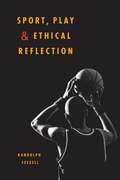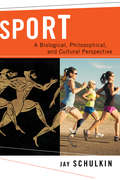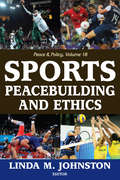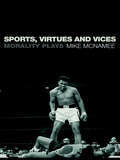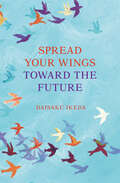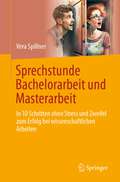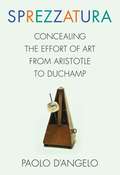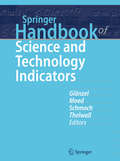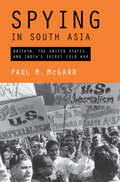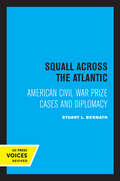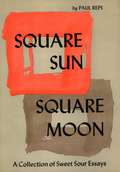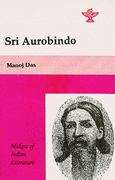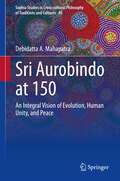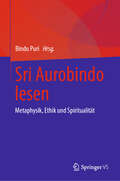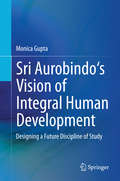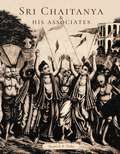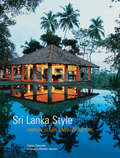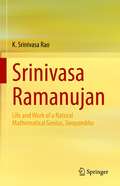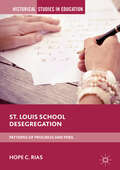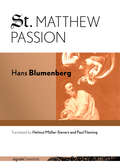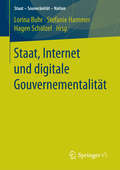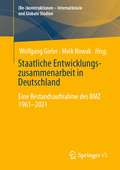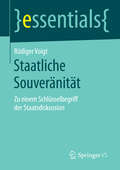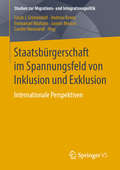- Table View
- List View
Sport, Play, and Ethical Reflection
by Randolph FeezellIn paperback for the first time, Randolph Feezell's Sport, Play, and Ethical Reflection immediately tackles two big questions about sport: "What is it?" and "Why does it attract so many people?" Feezell argues that sports participation is best described as a form of human play, and the attraction for participants and viewers alike derives from both its aesthetic richness and narrative structure. He then claims that the way in which sports encourage serious competition in trivial pursuits is fundamentally absurd, and therefore participation requires a state of irony in the participants, where seriousness and playfulness are combined. Feezell builds on these conclusions, addressing important ethical issues, arguing that sportsmanship should be seen as a kind of Aristotelian mean between the extremes of over- and under-investment in sport. Chapters on cheating, running up the score, and character building stress sport as a rule-governed, tradition-bound practice with standards of excellence and goods internal to the practice. With clear writing and numerous illuminating examples, Feezell demonstrates deep insight into both of his subjects.
Sport: A Biological, Philosophical, and Cultural Perspective
by Jay SchulkinSports are as varied as the people who play them. We run, jump, and swim. We kick, hit, and shoot balls. We ride sleds in the snow and surf in the sea. From the Olympians of ancient Greece to today's professional athletes, from adult pickup soccer games to children's gymnastics classes, people at all levels of ability at all times and in all places have engaged in sport. What drives this phenomenon?In Sport, the neuroscientist Jay Schulkin argues that biology and culture do more than coexist when we play sports—they blend together seamlessly, propelling each other toward greater physical and intellectual achievement. To support this claim, Schulkin discusses history, literature, and art—and engages philosophical inquiry and recent behavioral research. He connects sport's basic neural requirements, including spatial and temporal awareness, inference, memory, agency, direction, competitive spirit, and endurance, to the demands of other human activities. He affirms sport's natural role as a creative evolutionary catalyst, turning the external play of sports inward and bringing insight to the diversion that defines our species. Sport, we learn, is a fundamental part of human life.
Sports, Peacebuilding and Ethics (Peace And Policy Ser.)
by Linda M. JohnstonAs this latest volume in the Peace & Policy series shows, sports can be an effective mechanism for peacebuilding, especially when incorporated into conflict-resolution programs. Such programs have been designed to bring children together in post-conflict situations with an ultimate goal of reducing future violence. In examining such programs, the volume's contributors ask key questions: "What are the programs achieving?" and "How are they measuring success?" Although such programs have by and large been successful, some issues need to be addressed if these programs are to hone their effectiveness.Among the questions explored in the volume are: various aspects of culture and how they can help shape sports programs; the role of a coach in creating a culture of peace, and how this culture can fit into a peacebuilding process. Contributors also examine the role of sports in trauma relief programs in Rwanda; the role of universities in sports; and the role of sports in the demilitarization of child soldiers.The last three contributors tackle some of the legitimate concerns raised about using sports for peacebuilding, such as sports being competitive, violent, and focused on winning. Contributors look carefully at these and other issues that have arisen in sports as a tool of conflict resolution, discuss why they have become concerns, and consider some possible ways to deal with these concerns in the future.
Sports, Virtues and Vices: Morality Plays
by Mike McNameeSports have long played an important role in society. By exploring the evolving link between sporting behaviour and the prevailing ethics of the time this comprehensive and wide-ranging study illuminates our understanding of the wider social significance of sport. The primary aim of Sports, Virtues and Vices is to situate ethics at the heart of sports via ‘virtue ethical’ considerations that can be traced back to the gymnasia of ancient Greece. The central theme running through the book is that sports are effectively modern morality plays: universal practices of moral education for the masses and - when coached, officiated and played properly - a valuable vehicle for ethical development. Including a wealth of contemporary sporting examples, the book explores key ethical issues such as: How the pursuit of sporting excellence can lead to harm Doping, greed and shame Biomedical technology as a challenge to the virtue of elite athletes Defining a ‘virtue ethical account’ in sport Family vices and virtues in sport Written by one of the world's foremost sports philosophers, this book powerfully unites the fields of sports ethics and medical ethics. It is essential reading for all students and scholars with an interest in the ethics and philosophy of sport.
Spread Your Wings Toward the Future
by Daisaku IkedaDaisaku Ikeda has spent a lifetime traveling for peace around the world. In these essays about countries from Canada and Chile to Russia and Spain to Thailand and India, you'll learn about the places he's been, the people he's met, and the wisdom he's learned. Most of all you'll be inspired to take flight on your own wings and soar into the future.
Sprechstunde Bachelorarbeit und Masterarbeit: In 10 Schritten ohne Stress und Zweifel zum Erfolg bei wissenschaftlichen Arbeiten
by Vera SpillnerDieses Buch hilft Dir, Deine Bachelor- oder Masterarbeit erfolgreich und stressfrei zu erstellen. Von der Idee zur fertigen Arbeit werden schrittweise alle Etappen des wissenschaftlichen Arbeitens aufgezeigt und gemeinsam mit Dir eingeübt, um Deine Arbeit auf den richtigen Weg zu bringen. Die Abschlussarbeit im Studium ist kein Sprint, sondern ein Marathon. Vera Spillner zeigt Dir, wie Du diese Langstrecke bewältigst, wie Du die einzelnen Etappen planst, die wissenschaftlichen Anforderungen richtig erfüllst und Dich motivierst, wenn es mal schwierig wird. Als Betreuerin von Abschlussarbeiten hat die Autorin vielfach erlebt, dass ein systematisches Vorgehen plus eine positive Einstellung der Schlüssel zum Erfolg ist. Genau diesen Schlüssel hältst Du nun mit diesem Buch in den Händen. In dieser Sprechstunde werden Fragen, Schritte und Stolperfallen des wissenschaftlichen Arbeitens systematisch aufgearbeitet: Wie finde ich ein Thema, das auf meinen Interessen abgestimmt ist? Wie entwickle ich eine machbare und relevante Forschungsfrage? Welche Methode wende ich hierfür an? Wie schreibe ich ein Exposé, wie eine Einleitung? Was muss alles in die Gliederung? Wie finde ich einen Erst- und Zweitbetreuer? Wie viel Zeit sollte ich für meine Abschlussarbeit einplanen? Wie sieht wissenschaftliches Arbeiten aus? Was muss ich während der Schreibphase alles beachten? Was muss ich bei der Abgabe alles beachten?Die Autorin bietet für all diese Fragen (und mehr) Tipps, konkrete Vorschläge, Beispiele und gelegentliche Teepausen, um ohne Stress und Zweifel durch die Abschlussarbeit zu kommen.
Sprezzatura: Concealing the Effort of Art from Aristotle to Duchamp (Columbia Themes in Philosophy, Social Criticism, and the Arts)
by Paolo D'AngeloThe essence of art is to conceal art. A dancer or musician does not only need to perform with ability. There should also be a lack of visible effort that gives an impression of naturalness. To disguise technique and feign ease is to heighten beauty. To express this notion, Italian has a word with no exact equivalent in other languages, sprezzatura: a kind of unaffectedness or nonchalance.In this book, the first to consider sprezzatura in its own right, philosopher of art Paolo D’Angelo reconstructs the history of concealing art, from ancient rhetoric to our own times. The word sprezzatura was coined in 1528 by Baldassarre Castiglione in The Book of the Courtier to mean a kind of grace with a special essence: the ability to conceal art. But the idea reaches back to Aristotle and Cicero and forward to avant-garde works such as Duchamp’s ready-mades, all of which share the suspicion of the overt display of skill. The precept that art must be hidden turns up in a number of fields, from cosmetics to interior design, politics to poetry, the English garden to shabby chic. Through exploring different articulations of this idea, D’Angelo shows the paradox of aesthetics: art hides that it is art, but in doing so it reveals itself to be art and becomes an assertion about art. When art is concealed, it appears as spontaneous as nature—yet, paradoxically, also reveals its indebtedness to technique. An erudite and surprising tour through aesthetics, philosophy, and art history, Sprezzatura presents a strikingly original argument with deceptive ease.
Springer Handbook of Science and Technology Indicators (Springer Handbooks)
by Ulrich Schmoch Henk F. Moed Mike Thelwall Wolfgang GlänzelThis handbook presents the state of the art of quantitative methods and models to understand and assess the science and technology system. Focusing on various aspects of the development and application of indicators derived from data on scholarly publications, patents and electronic communications, the individual chapters, written by leading experts, discuss theoretical and methodological issues, illustrate applications, highlight their policy context and relevance, and point to future research directions.A substantial portion of the book is dedicated to detailed descriptions and analyses of data sources, presenting both traditional and advanced approaches. It addresses the main bibliographic metrics and indexes, such as the journal impact factor and the h-index, as well as altmetric and webometric indicators and science mapping techniques on different levels of aggregation and in the context of their value for the assessment of research performance as well as their impact on research policy and society. It also presents and critically discusses various national research evaluation systems.Complementing the sections reflecting on the science system, the technology section includes multiple chapters that explain different aspects of patent statistics, patent classification and database search methods to retrieve patent-related information. In addition, it examines the relevance of trademarks and standards as additional technological indicators.The Springer Handbook of Science and Technology Indicators is an invaluable resource for practitioners, scientists and policy makers wanting a systematic and thorough analysis of the potential and limitations of the various approaches to assess research and research performance.
Spying in South Asia: Britain, the United States, and India's Secret Cold War
by Paul M. McGarrIn this first comprehensive history of India's secret Cold War, Paul McGarr tells the story of Indian politicians, human rights activists, and journalists as they fought against or collaborated with members of the British and US intelligence services. The interventions of these agents have had a significant and enduring impact on the political and social fabric of South Asia. The spectre of a 'foreign hand', or external intelligence activity, real and imagined, has occupied a prominent place in India's political discourse, journalism, and cultural production. Spying in South Asia probes the nexus between intelligence and statecraft in South Asia and the relationships between agencies and governments forged to promote democracy. McGarr asks why, in contrast to Western assumptions about surveillance, South Asians associate intelligence with covert action, grand conspiracy, and justifications for repression? In doing so, he uncovers a fifty-year battle for hearts and minds in the Indian subcontinent.
Squall Across the Atlantic: American Civil War Prize Cases and Diplomacy
by Stuart L. BernathThis title is part of UC Press's Voices Revived program, which commemorates University of California Press’s mission to seek out and cultivate the brightest minds and give them voice, reach, and impact. Drawing on a backlist dating to 1893, Voices Revived makes high-quality, peer-reviewed scholarship accessible once again using print-on-demand technology. This title was originally published in 1970.
Square Sun Square Moon: A Collection of Sweet Sour Essays
by Paul RepsThis collection of Zen essays by the author of Zen Flesh, Zen Bones offers an enlightening perspective on a variety of topics.From the introduction:Not all of us can be exuberant travelers though we all dream of faraway places. <P><P>Not all of us can sec the subliminal with a penetrating eye, though many of us yearn to shake off the philistine shells that restrict our lives to the prosaic.Here, then, is your chance! In the privacy of your den, on the commode, in the library wherever you find reading most pleasurable reps invites you t o share his experiences vicariously. Within these pages, if you synchronize properly, you may find yourself in Tahiti where you "breathe this flowered air, drink the cascading water, cat the fruits and just sleep" until "you too become sweet."
Squaring the Circle in Descartes' Meditations
by Stephen I. WagnerDescartes' Meditations is one of the most thoroughly analyzed of all philosophical texts. Nevertheless, central issues in Descartes' thought remain unresolved, particularly the problem of the Cartesian Circle. Most attempts to deal with that problem have weakened the force of Descartes' own doubts or weakened the goals he was seeking. In this book, Stephen I. Wagner gives Descartes' doubts their strongest force and shows how he overcomes those doubts, establishing with metaphysical certainty the existence of a non-deceiving God and the truth of his clear and distinct perceptions. Wagner's innovative and thorough reading of the text clarifies a wide range of other issues that have been left unclear by previous commentaries, including the nature of the cogito discovery and the relationship between Descartes' proofs of God's existence. His book will be of great interest to scholars and upper-level students of Descartes, early modern philosophy and theology.
Sri Aurobindo at 150: An Integral Vision of Evolution, Human Unity, and Peace (Sophia Studies in Cross-cultural Philosophy of Traditions and Cultures #40)
by Debidatta A. MahapatraThis book brings to focus one of the prominent 20th century Indian thinkers, Sri Aurobindo, by providing an overview of his philosophy on life and yoga, and by elucidating his thought in the context of contemporary society. This text is unique in approaching Sri Aurobindo as a problem solver and from a conflict resolution perspective, the latter being the author’s expertise. Sri Aurobindo’s contributions such as Ideal of Human Unity, Integral Yoga, Life Divine and his poetic vision as embodied in his epic poem, Savitri, are explored in-depth. The book explores these ideas to seek possible solutions to the current predicaments of human life and society. This monograph attracts not only students and researchers in the fields of philosophy, religion, yoga, political science, international politics, Indian thought, and conflict resolution, but also general interest readers.
Sri Aurobindo lesen: Metaphysik, Ethik und Spiritualität
by Bindu PuriDieses Buch präsentiert zeitgenössische Perspektiven von Wissenschaftlern, die an verschiedenen Aspekten der Philosophie von Sri Aurobindo arbeiten – der Idee der Evolution, integralem Yoga, der Transformation des Individuums, der Gesellschaft und der Erde, Theorien der Nation und der menschlichen Einheit, Philosophie der Emotionen und Ethik des Umfelds. Die Mitwirkenden untersuchen Sri Aurobindos Philosophie, ihre enge konzeptionelle Beziehung zur klassischen indischen Philosophie und ihre Relevanz. Es beleuchtet, wie seine Philosophie mit den grundlegenden Problemen des 21. Jahrhunderts umgeht, und bietet mögliche Lösungen an. Das Buch beleuchtet die moderne Debatte in der westlichen Philosophie, an der Denker wie Michel Foucault, Jacques Derrida und Gilles Deleuze sowie ihre Vorgänger wie Martin Heidegger und Friedrich Nietzsche beteiligt sind. Dieses Buch ist eine Übung in vergleichender Philosophie, die den Geist von Sri Aurobindo im Kontext des indischen, europäischen und angloamerikanischen philosophischen Diskurses entschlüsselt. Es ist von großer Bedeutung für eine neue Generation von Studenten, Wissenschaftlern der indischen Philosophie, Politik, Religionswissenschaft und denjenigen, die sich für das Denken und die Praxis des indischen Denkers und Yogis Sri Aurobindo aus dem 20. Jahrhundert interessieren.
Sri Aurobindo's Vision of Integral Human Development
by Monica GuptaThis book explores the integral vision of human development contained in the original works of Sri Aurobindo and The Mother. It delves into multiple layers of the human personality as envisaged by Sri Aurobindo and The Mother and explores a new developmental science of consciousness based on the practice of Integral Yoga. The book examines the major metatheoretical conceptions that shape the contemporary discipline of developmental psychology and discusses the ways in which Sri Aurobindo's philosophical and psychological perspective can help break fresh ground for developmental theorisation and research by extending the current understanding of the human evolutionary potential. The author proposes a new agenda for human development which brings together the key ideas of integral individual and collective development and informs practices in the areas of counselling, education, parenting and self-development. This book will be of special interest for researchers of developmental psychology, human development, counselling psychology, philosophy, social work and education.
Sri Chaitanya & His Associates
by Swami B. B. Tirtha Maharaja"In this jewel-like volume, the venerable Tirtha Maharaja recounts the nectarean activities of the associates of Lord Gauranga and the acharyas of the Gaudiya Vaishnava religion." ––Swami B.P. Puri, Founder Acharya, Gopinath Gaudiya MathSrila Bhakti Ballabha Tirtha Goswami Maharaja has gathered a great deal of information about the lives of the devotees from numerous sources, and has made this information more relishable by virtue of his own insight. These biographies of Mahaprabhu's devotees should be read on their appearance and disappearance days, for this will bring great joy to both those who hear and those who read them. In this English translation, it will be possible for devotees around the world to enjoy them. Herein, the author delights in the life stories of Jagannath Mishra, Madhavendra Puri, Ishvara Puri, Advaita Acharya, Srivas Pandit, Chandrasekhar Acharya, Pundarika Vidyanidhi, Gadadhar Pandit, Vakresvara Pandit, Gadadhar Das, Shivananda Sen, Paramananda Puri, Murari Gupta, and many others. Every letter of these accounts is drenched with the nectar of devotion. The sincere seeker will never be able to enter the transcendental kingdom nor to advance in the devotional life unless they also discover this delight.
Sri Lanka Style
by Dominic Sansoni Channa DaswatteSri Lanka Style showcases over 30 of the finest traditional and modern dwellings in Sri Lanka, from private homes to retreats and resorts, all designed by the island's most creative architects and interior designers including some by the world-renowned architect Geoffrey Bawa that have never been seen before. These houses demonstrate the essentials of the Sri Lankan lifestyle-spaces open to the environment and the natural use of space and decor-and contribute to a palpable sense of peace and discipline. In addition, there are practical design ideas that can be applied to any tropical locale.
Srinivasa Ramanujan: Life and Work of a Natural Mathematical Genius, Swayambhu
by K. Srinivasa RaoThis book offers a unique account on the life and works of Srinivasa Ramanujan—often hailed as the greatest “natural” mathematical genius. Sharing valuable insights into the many stages of Ramanujan’s life, this book provides glimpses into his prolific research on highly composite numbers, partitions, continued fractions, mock theta functions, arithmetic, and hypergeometric functions which led the author to discover a new summation theorem. It also includes the list of Ramanujan’s collected papers, letters and other material present at the Wren Library, Trinity College in Cambridge, UK. This book is a valuable resource for all readers interested in Ramanujan’s life, work and indelible contributions to mathematics.
St. Louis School Desegregation: Patterns of Progress and Peril (Historical Studies in Education)
by Hope C. RiasThis book examines the history of the school desegregation movement in St. Louis, Missouri. Underlining the 2014 killing of Michael Brown as a catalyst for re-examination of school desegregation, Rias delves into the connection between contemporary school segregation and social justice, probing the ways that “soft racism”—a term the author uses to describe the non-violent, yet equally harmful, types of protests that opponents of desegregation utilized—has permeated St. Louis since the days of Brown v. Board of Education. The chapters feature the voices of those who were central to the desegregation fight in St. Louis, showing how the devastating effects of school segregation and soft racism linger today.
St. Matthew Passion (signale|TRANSFER: German Thought in Translation)
by Hans BlumenbergSt. Matthew Passion is Hans Blumenberg's sustained and devastating meditation on Jesus's anguished cry on the cross, "My God, my God, why have you forsaken me?" Why did this abandonment happen, what does it mean within the logic of the Gospels, how have believers and nonbelievers understood it, and how does it live on in art? With rare philological acuity and vast historical learning, Blumenberg unfolds context upon context in which this cry has reverberated, from early Christian apologetics and heretics to twentieth-century literature and philosophy. Blumenberg's guide through this unending story of divine abandonment is Johann Sebastian Bach's monumental Matthäuspassion, the parabolic mirror that bundled eighteen hundred years of reflection on the fate of the crucified and the only available medium that allows us post-Christian listeners to feel the anguish of those who witnessed the events of the Passion. With interspersed references to writers such as Goethe, Rilke, Kafka, Freud, and Benjamin, Blumenberg gathers evidence to raise the singular question that, in his view, Christian theology has not been able to answer: How can an omnipotent God be so offended by his creatures that he must sacrifice and abandon his own Son?
Staat, Internet und digitale Gouvernementalität
by Lorina Buhr Stefanie Hammer Hagen SchölzelDer Sammelband trägt theoriebildende und empirische Forschungsansätze, sowie neue Erkenntnisse zu einem in den sozialwissenschaftlichen Betrachtungen bisher wenig bearbeiteten Forschungsfeld – den vielschichtigen Beziehungen zwischen Staat, Internet, Regierungsrationalitäten und Regierungstechniken – zusammen. Um neue Impulse für eine intensivere inter- und transdisziplinäre Diskussion zu setzen, verfolgt die Publikation das Anliegen, die Vernetzung und den wissenschaftlichen Austausch der in diesem Feld aktiven (Nachwuchs-)Forscher zu initiieren bzw. zu vertiefen, sowie den bisher erarbeiteten Wissensstand zusammenzutragen und einer interessierten Fachöffentlichkeit zugänglich zu machen. Die Beiträge widmen sich einem Bündel an Fragen aus unterschiedlichen Perspektiven: Was macht das digital-binäre System und die Digitalität mit dem Staat, mit Staatlichkeiten, mit Regierungsweisen und Regierungsformen? Wie interagieren und konvergieren digitale Technologien und Regierungstechnologien? Wie lässt sich diese Phänomenlage konzeptionell sowohl von der politischen Theorie und Soziologie als auch von einer politisch orientierten Medien(kultur)wissenschaft einholen?
Staatliche Entwicklungszusammenarbeit in Deutschland: Eine Bestandsaufnahme des BMZ 1961-2021 ((Re-)konstruktionen - Internationale und Globale Studien)
by Wolfgang Gieler Meik NowakSeit der Gründung des Bundesministeriums für wirtschaftliche Zusammenarbeit und Entwicklung (BMZ) am 14. November 1961 wurde es von 13 Minister*innen geleitet. Die deutsche staatliche Entwicklungszusammenarbeit (EZ) der vergangenen 60 Jahre wurde von diesen Persönlichkeiten unterschiedlicher biographischer Herkunft und parteipolitischer Zugehörigkeit aufgebaut, weiterentwickelt und mitunter entscheidend geprägt. Die Beiträge dieses Bandes bieten einen fundierten Überblick über die Biographie aller Minister*innen, stellen ihre spezifischen entwicklungspolitischen Konzeptionen dar und analysieren deren Verwirklichung und Bewährung. In einer abschließenden Würdigung wird jeweils der Versuch unternommen, den individuellen Einfluss auf die nationale und internationale Entwicklungspolitik zu bestimmen. Ergänzt werden die ministeriellen Porträts um die institutionelle Rolle des BMZ – von der Entwicklungshilfe über Entwicklungspolitik bis zur Entwicklungszusammenarbeit in zeithistorischer Perspektive. Abgerundet wird dieses Grundlagenwerk mit umfangreichen Daten und Fakten zur staatlichen deutschen EZ.
Staatliche Souveränität: Zu einem Schlüsselbegriff der Staatsdiskussion (essentials)
by Rüdiger VoigtDas essential erläutert zunächst die Begriffsgeschichte und Bedeutung der Souveränität für den Staat des 21. Jahrhunderts und beschreibt die drei Typen Parlamentssouveränität, Rechts- bzw. Verfassungssouveränität sowie (direkte) Volkssouveränität. Anschließend analysiert der Autor den Begriff der nationalstaatlichen Souveränität im Kontext der Globalisierung, Internationalisierung sowie Europäisierung und stellt die Auswirkungen des globalen Finanzkapitalismus auf die nationalstaatliche Souveränität dar. Die Übertragung von Kernkompetenzen an die Europäische Union bei gleichzeitigem Souveränitätsverlust der Mitgliedstaaten und die Kontroverse zwischen Universalisten, Nationalisten und Partikularisten werden kritisch diskutiert. Abschließend liefert das essential Ansatzpunkte zu einer Erneuerung der Volkssouveränität im demokratischen Rechtsstaat.
Staatsbürgerschaft im Spannungsfeld von Inklusion und Exklusion: Internationale Perspektiven (Studien zur Migrations- und Integrationspolitik)
by Sarah J. Grünendahl Andreas Kewes Emmanuel Ndahayo Jasmin Mouissi Carolin NieswandtStaatsbürgerschaft gilt in soziologischer Theorie und politischer Praxis als Ausdruck gesellschaftlicher Zugehörigkeit und politischer Teilhabe. Der Band lädt dazu ein, sich dem Konzept der Staatsbürgerschaft als einem wandelbaren und spannungsreichen Konzept zu nähern. Einerseits zeigen die Beiträge, wie die Ergänzung und praktische Inanspruchnahme von (Staats-)Bürgerschaft auf lokaler Ebene und in zivilgesellschaftlichen Kontexten geschieht. Andererseits gerät auch die exklusive Wirkung von Staatsbürgerschaft in gesellschaftlichen Aushandlungen, rechtlicher Praxis und (Bildungs-) Politiken in den Blick.
